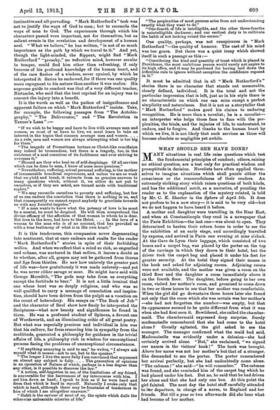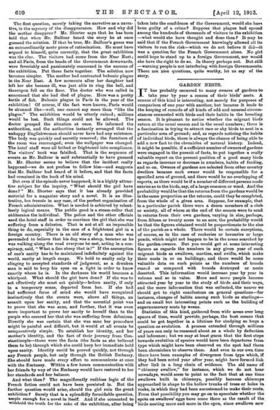WHAT SHOULD SHE HAVE DONE?
MANY situations in real life raise questions which test the fundamental principles of conduct; others, raising no ethical question, are a test only for practical wisdom and promptitude in decision. Novelists have often applied them- selves to imagine situations which shall puzzle either the conscience or the resourcefulness of their readers. An extremely striking story which raises questions of both kinds, and has the additional merit, as a narrative, of puzzling the reader as to the explanation of the mystery related, is told by Mr. C. K. Shorter in the Sphere of April 5th. It does not profess to be a new story— it is said to be very old—but we do not happen to have heard it before.
A mother and daughter were travelling in the Near East, and when at Constantinople they read in a newspaper that the Paris Exhibition—the last one—was about to open. They determined to hasten their return home in order to see the the exhibition at an early stage, and accordingly travelled by express, and arrived in Paris one evening at nine o'clock. At the Gare de Lyon their luggage, which consisted of two boxes and a carpet bag, was placed by the porter on the top of the carriage in which they drove to their hotel, but the driver took the carpet bag and placed it under his feet for greater security. At the hotel they signed their names in the book and asked for adjoining rooms. Adjoining rooms were not available, and the mother was given a room on the third floor and the daughter a room immediately above it on the fourth floor. The daughter, before going to her own room, visited her mother's room, and promised to come down in two or three hours to see that her mother was comfortable. When the girl did go downstairs three hours later she found not only that the room which she was certain was her mother's —she had not forgotten the number—was empty, but that its appearance seemed to be quite different from what it was when she had first seen it. Bewildered, she called the chamber- maid. The chambermaid expressed deep surprise. Surely mademoiselle remembered that she had come to the hotel alone ? Greatly agitated, the girl asked to see the manager. The manager confirmed what the maid had said. Mademoiselle was evidently under a delusion—she had certainly arrived alone. "But," she exclaimed, "we signed our names in tho visitors' book !" The book was brought. Above her name was not her mother's but that of a stranger. She demanded to see the porter. The porter remembered her arrival perfectly, but she had undoubtedly come alone. "The cabman ! " she said—" he will remember." The cabman was found, and she reminded him of the carpet bag which he had placed under his feet. But no, he said that be had driven her alone and that she had only one box. At this point the girl fainted. The next day the hotel staff carefully attended to Der departure, in charge of a nurse, to England and her friends. Not till a year or two afterwards did she hear what bad become of her mother.
The first question, merely taking the narrative as a narra- tive, is the mystery of the disappearance. How and why did the mother disappear ? Mr. Shorter says that he has been told that when Mr. Balfour heard the story he at once guessed the solution. If that be true, Mr. Balfour' s guess was an extraordinarily acute piece of ratiocination. He must have argued to himself, quite correctly, that the great exhibition was the clue. The visitors had come from the Near East; and all Paris, from the heads of the Government downwards, were feverishly and passionately concerned in the success of the exhibition. Put these facts together. The solution now becomes simpler. The mother had contracted bubonic plague in the Near East. A few moments after her daughter had left her she became ill, was just able to ring the bell, and thereupon fell on the floor. The doctor who was called in announced that she had died of plague. Here was a pretty kettle of fish. Bubonic plague in Paris in the year of the exhibition! Of course, if the fact were known, Paris would be shunned like—well, one cannot say more than "like the plague." The exhibition would be utterly ruined ; millions would be lost. Such things could not be allowed. The doctor grasped the situation at once. He informed the authorities, and the authorities instantly arranged that the unhappy Englishwoman should never have had any existence. The body was quickly and secretly removed; the furniture of the room was rearranged; even the wallpaper was changed. The hotel staff were all bribed or frightened into compliance. The visitors' book was falsified. That is the sequence of events as Mr. Balfour is said substantially to have guessed it. Mr. Shorter seems to believe that the incident really happened—we do not profess to follow him—and suggests that Mr. Balfour had heard of it before, and that the facts had remained in the back of his mind.
But even if the episode never happened, it is a highly attrac- tive subject for the inquiry, "What should the girl have done ?" Mr. Shorter says that it has already provided material for a magazine story and a novel. It is an illus- tration, ben trovato in any case, of the perfect organization of French administration. What is needed is achieved by relent- lessly logical means. The public good is a steam-roller that obliterates the individual. The police and the other officials nsed the hotel staff in order to convince the girl that she was suffering from a delusion. That is not at all an impossible thing to do, especially in the case of a frightened girl in a foreign country. There is an old story of a man who was persuaded to believe that his dog was a sheep, because as he was walking along the road everyone he met, acting in a con- spiracy, said, "What a fine sheep that is!" If the assumption of one's sanity has to be maintained indefinitely against the world, sanity at length snaps. We hold to sanity only by clinging to accepted standards of judgment, as a drunken man is said to keep his eyes on a light in order to know exactly where he is. In the darkness his world becomes a whirlpool. What should the girl have done ? If she was to act effectively she must act quickly—before sanity, if only in a temporary sense, departed from her. If she had had sufficient force of mind she would have recognized instinctively that the events were, above all things, an assault upon her sanity, and that the essential point was to prove that she was sane, and further, that it was even more important to prove her sanity to herself than to the people who assured her that she was suffering from delusions. Directly she was certain that she was sane her procedure might be painful and difficult, but it would at all events be comparatively simple. To establish her identity, and her mother's identity, and the fact of their journey from Con- stantinople—those were the facts (the facts as she believed them to be) through which she could keep her immediate hold upon sanity. Identity could be proved quickly, not through any French people, but only through the British Embassy. She should have made every effort to communicate at once with the Embassy. Within a few hours communication with her friends by way of the Embassy would have restored to her her standards and her balance.
And what then ? The magnificently ruthless logic of the French fiction could not have been persisted in. But the further question would arise, should the girl ruin the great exhibition ? Surely that is a splendidly formidable question, ample enough for a novel in itself. And if she consented to withhold the truth for the sake of the exhibition, after being taken into the confidence of the Government, would she hairs been guilty of a crime? Suppose that plague bad spread among the hundreds of thousands of visitors to the exhibition —what would she have thought and done then ? It may be said that if the French Government knowingly allowed all its visitors to run the risk—which we do not believe it did—it was a question for the French Government alone. No girl could hope to stand up to a foreign Government, nor would she have the right to do so. In theory perhaps not. But still —warning people is not interfering with foreign Governments. These are nice questions, quite worthy, let us say of the story.











































 Previous page
Previous page